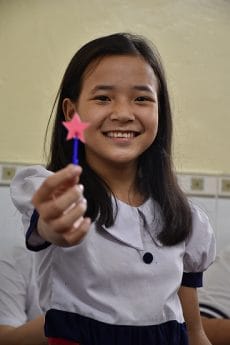
Apr 7, 2018 | Focolare Worldwide
 Easter is now over: today is Easter Monday and it’s a normal working day. It’s really hot and the rain is menacing the skies. It is only the Christians who are feasting. Here and there one can hear the cheering and the cries of Alleluia seeping out from the homes. And yet I’m in a Communist country. But as one goes out of the church, the streets are filled with the incredible sound of motorbikes blocking the traffic. The police in front of the cathedral have to direct the traffic. In order to take part in the Easter Triduum, one has to arrive 30 minutes before to find a place. In church I leave the bag on the bench and nobody touches it. I look at the people: many children, young people, couples and the elderly with their sober but smiling faces. I think of Europe, of the half-empty churches even on feast days. In these parts, even at 5 o’clock in the morning of any day, children, even small ones, together with the adults are in the first rows to sing. Here, everyone knows the prayers and the hymns by heart. In Saigon every corner is swarmed in a disorderly and nearly savage life. Yet, there is a lot of faith, perhaps as in no other Asian city. Because here faith comes at a cost. Everything costs in Vietnam. Some time ago I made a journey by bus, five and a half hours with a throng of people and in the heat. At a certain point quintals of Indian maize were loaded onto the bus among the travellers, dragged underfoot into the baggage compartment. The people started to scream whilst the driver and his assistant shouted at them to shut up. A lady near me who felt embarrassed at seeing me in that confusion, told me: “Life here is hard. Don’t forget it if you want to live here”. I don’t know that lady’s name and perhaps I’ll never see her again. But those words opened a new dimension within me. Life, theirs as well as mine, has to pass through pain, weariness, suffering, to then flow with joy. I understood her this way. From that day everything in me was simplified. Like everybody, I experience joy, but also pain and fatigue. I am one of them. I’m not even considered special because I’m a foreigner, but just one among many foreigners.
Easter is now over: today is Easter Monday and it’s a normal working day. It’s really hot and the rain is menacing the skies. It is only the Christians who are feasting. Here and there one can hear the cheering and the cries of Alleluia seeping out from the homes. And yet I’m in a Communist country. But as one goes out of the church, the streets are filled with the incredible sound of motorbikes blocking the traffic. The police in front of the cathedral have to direct the traffic. In order to take part in the Easter Triduum, one has to arrive 30 minutes before to find a place. In church I leave the bag on the bench and nobody touches it. I look at the people: many children, young people, couples and the elderly with their sober but smiling faces. I think of Europe, of the half-empty churches even on feast days. In these parts, even at 5 o’clock in the morning of any day, children, even small ones, together with the adults are in the first rows to sing. Here, everyone knows the prayers and the hymns by heart. In Saigon every corner is swarmed in a disorderly and nearly savage life. Yet, there is a lot of faith, perhaps as in no other Asian city. Because here faith comes at a cost. Everything costs in Vietnam. Some time ago I made a journey by bus, five and a half hours with a throng of people and in the heat. At a certain point quintals of Indian maize were loaded onto the bus among the travellers, dragged underfoot into the baggage compartment. The people started to scream whilst the driver and his assistant shouted at them to shut up. A lady near me who felt embarrassed at seeing me in that confusion, told me: “Life here is hard. Don’t forget it if you want to live here”. I don’t know that lady’s name and perhaps I’ll never see her again. But those words opened a new dimension within me. Life, theirs as well as mine, has to pass through pain, weariness, suffering, to then flow with joy. I understood her this way. From that day everything in me was simplified. Like everybody, I experience joy, but also pain and fatigue. I am one of them. I’m not even considered special because I’m a foreigner, but just one among many foreigners.  The story of that Man who hung from a cross, similar to those of many people I meet each day, reminds me of the words of that lady. I can find it in the poor who have nothing, in the sick man with a tumour, with bones jutting out from his ribs, who has no money to cure himself. Or in that lady, Giau, 64, who though poor, adopted a Down Syndrome child who had been literally thrown out by the parents. And yet, it’s Easter. Even for the Rohingya refugees, living between Myanmar and Bangladesh. It’s Easter in North Korea which seeks peace after having fired missiles. It’s Easter amongst the allied troops who are preparing for the umpteenth drill. It’s Easter for the children of Xang Cut, in the delta zone of Mikong, where the water is still infested through Agent Orange, thrown by the allies 40 years ago. And it’s Easter for the children of Saigon, gathered from the streets and given education by the teachers of Pho. They will have something to eat thanks to their heroic love. Even here, in the midst of many challenges, dangers, widespread pollution and an overwhelming sense of hopelessness, someone continues to smile, because they are loved and helped by a friendly hand. This is Easter: taking care of others, relieving their pain, sharing their tears. The world, the other, belongs to me. And my happiness passes through that of others, of many others.
The story of that Man who hung from a cross, similar to those of many people I meet each day, reminds me of the words of that lady. I can find it in the poor who have nothing, in the sick man with a tumour, with bones jutting out from his ribs, who has no money to cure himself. Or in that lady, Giau, 64, who though poor, adopted a Down Syndrome child who had been literally thrown out by the parents. And yet, it’s Easter. Even for the Rohingya refugees, living between Myanmar and Bangladesh. It’s Easter in North Korea which seeks peace after having fired missiles. It’s Easter amongst the allied troops who are preparing for the umpteenth drill. It’s Easter for the children of Xang Cut, in the delta zone of Mikong, where the water is still infested through Agent Orange, thrown by the allies 40 years ago. And it’s Easter for the children of Saigon, gathered from the streets and given education by the teachers of Pho. They will have something to eat thanks to their heroic love. Even here, in the midst of many challenges, dangers, widespread pollution and an overwhelming sense of hopelessness, someone continues to smile, because they are loved and helped by a friendly hand. This is Easter: taking care of others, relieving their pain, sharing their tears. The world, the other, belongs to me. And my happiness passes through that of others, of many others.

Mar 26, 2018 | Focolare Worldwide

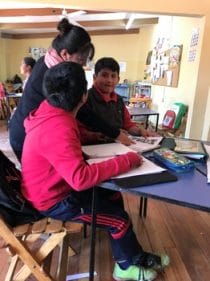
Mar 25, 2018 | Focolare Worldwide
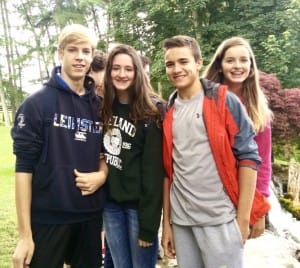 Green and friendly Ireland is full of excellent schools for students of all ages to learn English. Language Learning International (LLI) is no exception. Various kinds of study vacations are available with cutting edge learning techniques, family programs, culture, sport and entertainment, along with internships in France and Spain for Irish students. What distinguishes the educational approach of this school, which was founded in 1989 by Eugene Murphy in Dublin, is the quality of the relationships with the students in a welcoming atmosphere and a sensitive look towards the personal characteristics of each individual. But there is something else. The LLI, with its over 2 thousand students every year, is a representative of the Economy of Communion (EoC) in the training sector. The following experiences were drawn from the EoC website. “A boy showed up at summer camp with Asperger Syndrome, which we didn’t know anything about until he arrived. The first lodgings were not very appropriate for him, because they weren’t able to meet the particular needs of the youngster. They tried moving him to another family, but the difficulties began again. Even though the summer is a very intense season, in the business we want to be sure to ensure just and serene treatment for anyone comes, so we looked for another alternative until we were able to find an elderly woman who was happy to host the boy, being very familiar herself with the syndrome that her grandson also suffered from. Everything turned out positive for everyone: The student was able to take full advantage of the experience and return home happy in the evening. And the person in charge of relations with the family declared that the presence of the boy in the program had filled the entire season with value!” “Great atmosphere at the English course, in the classroom and excellent relationships established; one of the tests to be prepared, however, was an individual oral presentation. Suddenly a 15-year-old boy approached Eugene Murphy, the school’s founder and expert trainer. He told her that he would be unable to do it because of his stuttering. Eugene talked to other trainers and they decide to reassure the boy by doing the test privately. In the end, the teachers encouraged him to share the experience with others anyway, the young man agreed and, between his own emotion and the general emotion, the test concluded with a long applause from the class. It was then discovered that the boy had not spoken until the age of 7 and that performance in public turned out to be a sort of miracle that made him and his parents incredibly joyful”.
Green and friendly Ireland is full of excellent schools for students of all ages to learn English. Language Learning International (LLI) is no exception. Various kinds of study vacations are available with cutting edge learning techniques, family programs, culture, sport and entertainment, along with internships in France and Spain for Irish students. What distinguishes the educational approach of this school, which was founded in 1989 by Eugene Murphy in Dublin, is the quality of the relationships with the students in a welcoming atmosphere and a sensitive look towards the personal characteristics of each individual. But there is something else. The LLI, with its over 2 thousand students every year, is a representative of the Economy of Communion (EoC) in the training sector. The following experiences were drawn from the EoC website. “A boy showed up at summer camp with Asperger Syndrome, which we didn’t know anything about until he arrived. The first lodgings were not very appropriate for him, because they weren’t able to meet the particular needs of the youngster. They tried moving him to another family, but the difficulties began again. Even though the summer is a very intense season, in the business we want to be sure to ensure just and serene treatment for anyone comes, so we looked for another alternative until we were able to find an elderly woman who was happy to host the boy, being very familiar herself with the syndrome that her grandson also suffered from. Everything turned out positive for everyone: The student was able to take full advantage of the experience and return home happy in the evening. And the person in charge of relations with the family declared that the presence of the boy in the program had filled the entire season with value!” “Great atmosphere at the English course, in the classroom and excellent relationships established; one of the tests to be prepared, however, was an individual oral presentation. Suddenly a 15-year-old boy approached Eugene Murphy, the school’s founder and expert trainer. He told her that he would be unable to do it because of his stuttering. Eugene talked to other trainers and they decide to reassure the boy by doing the test privately. In the end, the teachers encouraged him to share the experience with others anyway, the young man agreed and, between his own emotion and the general emotion, the test concluded with a long applause from the class. It was then discovered that the boy had not spoken until the age of 7 and that performance in public turned out to be a sort of miracle that made him and his parents incredibly joyful”.  LLI Director, Cathy Young, tells about a new project that has involved the school in an adventure of openness with a geographic region that is quite far from Ireland: “We wanted to undertake a Economy of Communion project that focused on education. On the United World Association website, we learned of a fantastic project in Bolivia, called Fondazione Unisol, which offers support to several of the poorest families in Cochabamba. We made contact and have put together a project that will finance the purchase of new books and portable computers, furnish new desks and chairs for classrooms, and support the work of two teachers”. “This reciprocal exchange,” says Cathy, “is one of the most beautiful aspects of our collaboration, and it helps us to live better in our daily work environment.” At LLI the students have a live learning experience of the meaning of many words, but the first is sharing. Chiara Favotti
LLI Director, Cathy Young, tells about a new project that has involved the school in an adventure of openness with a geographic region that is quite far from Ireland: “We wanted to undertake a Economy of Communion project that focused on education. On the United World Association website, we learned of a fantastic project in Bolivia, called Fondazione Unisol, which offers support to several of the poorest families in Cochabamba. We made contact and have put together a project that will finance the purchase of new books and portable computers, furnish new desks and chairs for classrooms, and support the work of two teachers”. “This reciprocal exchange,” says Cathy, “is one of the most beautiful aspects of our collaboration, and it helps us to live better in our daily work environment.” At LLI the students have a live learning experience of the meaning of many words, but the first is sharing. Chiara Favotti
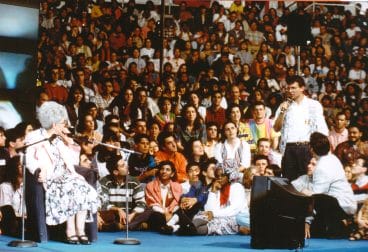
Mar 23, 2018 | Focolare Worldwide
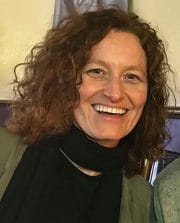
Michelle Sopala
 And now for the Genfest, itself! Even though it was a life-changing event in all its aspects, I can’t hide it: for me the highlight was the meeting with Chiara. I don’t know if the other 12 thousand young people in the arena felt the same, but I felt like Chiara was talking to me, and me alone. When Noel asked her the final question, «Chiara, from the bottom of your heart, what would you like to say to us young people?», her answer rang out like a war-call that still rings in my ears. With a super-astute intuition and understanding of what the young heart yearns for, she quoted St. Catherine who had told her disciples not to be satisfied with small things because “God wants them big!”. «You, young people – she said, with a conviction that went straight to the heart – don’t be satisfied with crumbs… with small joys… but aim high and seek the fullness of joy: that joy that comes from living out unity!» Hmm. For better or for worse, that’s been my experience ever since. “Unity”? A deep word that I’m still discovering after these 23 years. But that “fullness of joy”? Yep! I’ve found it! Oh! …and by the way, our performance was chosen. Take a look. Hope you like it! Michelle Sopala
And now for the Genfest, itself! Even though it was a life-changing event in all its aspects, I can’t hide it: for me the highlight was the meeting with Chiara. I don’t know if the other 12 thousand young people in the arena felt the same, but I felt like Chiara was talking to me, and me alone. When Noel asked her the final question, «Chiara, from the bottom of your heart, what would you like to say to us young people?», her answer rang out like a war-call that still rings in my ears. With a super-astute intuition and understanding of what the young heart yearns for, she quoted St. Catherine who had told her disciples not to be satisfied with small things because “God wants them big!”. «You, young people – she said, with a conviction that went straight to the heart – don’t be satisfied with crumbs… with small joys… but aim high and seek the fullness of joy: that joy that comes from living out unity!» Hmm. For better or for worse, that’s been my experience ever since. “Unity”? A deep word that I’m still discovering after these 23 years. But that “fullness of joy”? Yep! I’ve found it! Oh! …and by the way, our performance was chosen. Take a look. Hope you like it! Michelle Sopala
https://youtu.be/LX6rNkyGjoE
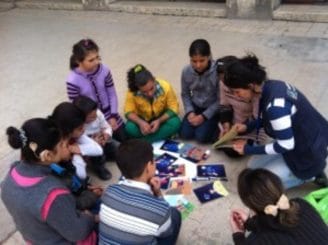
Mar 22, 2018 | Focolare Worldwide
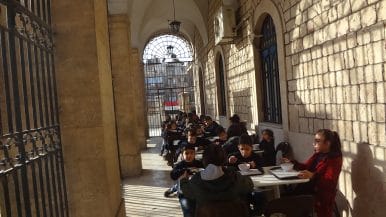 The story of Jean and Vivian is a story of love, hope and courage. They met in Aleppo, Syria, in 2000 while belonging to the Focolare Movement. Vivian is a widow with a one year-old son who is totally deaf. Jean is a carpenter and socially active. Their common commitment to living the Gospel and bringing the ideal of a united world to humanity brought them closer and, in 2003 they got married and have four children. Vivian’s first son, Marc, was the motivation behind their adventure. Because of his need for special care, Vivian went to Lebanon where Marc would later follow and stay at a centre run by the Focolare: “It’s really a foretaste of Heaven,” he says. “Living the Gospel in daily life accompanies the whole educational process. The children grow up in this oasis of peace and develop their talents while overcoming their handicap. The dream began to grow in me of setting up an institute myself, in my own city of Aleppo.” Jean supported him in his venture and, in 2005, their small centre was begun. Other larger ones would follow with larger capacity for up to ten children, all from poor families who couldn’t afford the cost. The centre was always in deficit: “Whenever we needed something,” Jean recalls, “we’d go in front of the crucifix and hand over our needs to Him. Providence arrived right on time every time.”
The story of Jean and Vivian is a story of love, hope and courage. They met in Aleppo, Syria, in 2000 while belonging to the Focolare Movement. Vivian is a widow with a one year-old son who is totally deaf. Jean is a carpenter and socially active. Their common commitment to living the Gospel and bringing the ideal of a united world to humanity brought them closer and, in 2003 they got married and have four children. Vivian’s first son, Marc, was the motivation behind their adventure. Because of his need for special care, Vivian went to Lebanon where Marc would later follow and stay at a centre run by the Focolare: “It’s really a foretaste of Heaven,” he says. “Living the Gospel in daily life accompanies the whole educational process. The children grow up in this oasis of peace and develop their talents while overcoming their handicap. The dream began to grow in me of setting up an institute myself, in my own city of Aleppo.” Jean supported him in his venture and, in 2005, their small centre was begun. Other larger ones would follow with larger capacity for up to ten children, all from poor families who couldn’t afford the cost. The centre was always in deficit: “Whenever we needed something,” Jean recalls, “we’d go in front of the crucifix and hand over our needs to Him. Providence arrived right on time every time.”  The breakout of the war in 2011 brought much death and destruction. Jean lost his carpentry, the centre wasn’t having any financial input and many were living on help from the Church and humanitarian organizations. Many left the country and, even though Jean and Vivian were tormented at the thought, they bought tickets to go. But one thing became clearer and clearer in their hearts: they couldn’t leave “their” deaf children and destroy that dream that had come true with so much effort. “On the night before our departure, I stepped into church,” Jeans says, “I had a deep conversation with Jesus, face to face, man to man. He seemed to speak in my heart and asked me not to go: what would the children now? I felt him posing this tragic question to me. I put my children in His hands. I went home and Vivian and I decided to rip up the tickets and stay in the city forever to be a help to the people who needed us.” “We were hopeful that God would accompany and support us in all our future projects and especially in our family,” echoed Vivian, “and that’s what happened.” Now the centre is their second home, their children also take part in the life of the group and Jean works full time “This community has widened our hearts. There is no longer boy or girl, student or teacher, healthy or handicapped, Muslim or Christian. We live in the one love and beneath the same gaze of a God-Love, incarnate, living in our midst.”
The breakout of the war in 2011 brought much death and destruction. Jean lost his carpentry, the centre wasn’t having any financial input and many were living on help from the Church and humanitarian organizations. Many left the country and, even though Jean and Vivian were tormented at the thought, they bought tickets to go. But one thing became clearer and clearer in their hearts: they couldn’t leave “their” deaf children and destroy that dream that had come true with so much effort. “On the night before our departure, I stepped into church,” Jeans says, “I had a deep conversation with Jesus, face to face, man to man. He seemed to speak in my heart and asked me not to go: what would the children now? I felt him posing this tragic question to me. I put my children in His hands. I went home and Vivian and I decided to rip up the tickets and stay in the city forever to be a help to the people who needed us.” “We were hopeful that God would accompany and support us in all our future projects and especially in our family,” echoed Vivian, “and that’s what happened.” Now the centre is their second home, their children also take part in the life of the group and Jean works full time “This community has widened our hearts. There is no longer boy or girl, student or teacher, healthy or handicapped, Muslim or Christian. We live in the one love and beneath the same gaze of a God-Love, incarnate, living in our midst.”
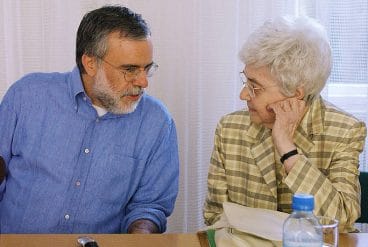
Mar 21, 2018 | Focolare Worldwide
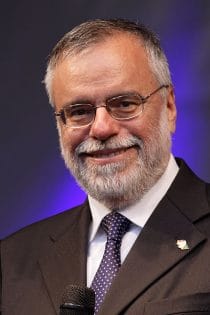 We meet Andrea Riccardi, founder of the Community of Sant’Egidio, at Castel Gandolfo, not far from the Mariapolis Center there. It feels like a holiday, since hundreds of people (in the end they will count close to 2,000) are flowing toward an event on the occasion of the 10th anniversary of Chiara Lubich’s passing. Outside the door of the small hall where we meet, there are many festive voices. “Ten years later, as we return to Chiara Lubich, it is not a return to the past, like archeology,” says Riccardi. “It’s not even a sentimental memory, as people can have for someone who was important in the Church. “But,” he confides, “It is certainly something important in my life.” He mentions the pivotal years in Europe, when democracy was returning after a century-long interruption, when the walls and iron curtains were being dismantled. “I think that Chiara’s message is even more relevant today than it was during the Cold War or in 1989. Today, in this global world, her message speaks of the common destiny of all of us, of the unity of peoples and the human family. Yet it is not a sociologist’s typical message, but a profound one, given that Chiara was a woman who was able to summarize as well as go into depth, to analyze and communicate simply. “Today we need a message of unity, because this global world is not united spiritually. Patriarch Athenagoras, a great friend of Chiara, said, ‘The world is unifying, but there is no spiritual unity.’ “And Chiara tells us that this world can be united, rich with poor, those nearby with those far away, those native to a place with those who have just arrived. Chiara also tells us,” Riccardi adds, “that we, mere men and women, the young and the elderly, that you too, can change the world.
We meet Andrea Riccardi, founder of the Community of Sant’Egidio, at Castel Gandolfo, not far from the Mariapolis Center there. It feels like a holiday, since hundreds of people (in the end they will count close to 2,000) are flowing toward an event on the occasion of the 10th anniversary of Chiara Lubich’s passing. Outside the door of the small hall where we meet, there are many festive voices. “Ten years later, as we return to Chiara Lubich, it is not a return to the past, like archeology,” says Riccardi. “It’s not even a sentimental memory, as people can have for someone who was important in the Church. “But,” he confides, “It is certainly something important in my life.” He mentions the pivotal years in Europe, when democracy was returning after a century-long interruption, when the walls and iron curtains were being dismantled. “I think that Chiara’s message is even more relevant today than it was during the Cold War or in 1989. Today, in this global world, her message speaks of the common destiny of all of us, of the unity of peoples and the human family. Yet it is not a sociologist’s typical message, but a profound one, given that Chiara was a woman who was able to summarize as well as go into depth, to analyze and communicate simply. “Today we need a message of unity, because this global world is not united spiritually. Patriarch Athenagoras, a great friend of Chiara, said, ‘The world is unifying, but there is no spiritual unity.’ “And Chiara tells us that this world can be united, rich with poor, those nearby with those far away, those native to a place with those who have just arrived. Chiara also tells us,” Riccardi adds, “that we, mere men and women, the young and the elderly, that you too, can change the world.  “Chiara was a friend to great people and appreciated by great people. I think of her friendship with John Paul II, who called her his ‘peer, his equal in age.’ But Chiara also showed that the world can change through the least of us who has faith. Like Mary with the Magnificat. “She helped me to understand the value of a charism, because Chiara recognized in me, in the Community of Sant’Egidio, a charism. She had a deep sense of people and experiences of Church.” Riccardi concludes: “For me Chiara is also a very dear memory of a profound friendship. She was a friend, a friend in the small things, in the attention she gave when she invited you to her table, in the phone calls, in taking care of you. “She was also someone who saw accurately in important moments for the Church. I think of, for example, of when John Paul II met with ecclesial movements. Chiara said, ‘This was a flash of inspiration from the Pope, a point of arrival that must also become a new point of departure.’ “Today my affection is accompanied with prayerful thoughts with Chiara, for Chiara.”
“Chiara was a friend to great people and appreciated by great people. I think of her friendship with John Paul II, who called her his ‘peer, his equal in age.’ But Chiara also showed that the world can change through the least of us who has faith. Like Mary with the Magnificat. “She helped me to understand the value of a charism, because Chiara recognized in me, in the Community of Sant’Egidio, a charism. She had a deep sense of people and experiences of Church.” Riccardi concludes: “For me Chiara is also a very dear memory of a profound friendship. She was a friend, a friend in the small things, in the attention she gave when she invited you to her table, in the phone calls, in taking care of you. “She was also someone who saw accurately in important moments for the Church. I think of, for example, of when John Paul II met with ecclesial movements. Chiara said, ‘This was a flash of inspiration from the Pope, a point of arrival that must also become a new point of departure.’ “Today my affection is accompanied with prayerful thoughts with Chiara, for Chiara.”

 Easter is now over: today is Easter Monday and it’s a normal working day. It’s really hot and the rain is menacing the skies. It is only the Christians who are feasting. Here and there one can hear the cheering and the cries of Alleluia seeping out from the homes. And yet I’m in a Communist country. But as one goes out of the church, the streets are filled with the incredible sound of motorbikes blocking the traffic. The police in front of the cathedral have to direct the traffic. In order to take part in the Easter Triduum, one has to arrive 30 minutes before to find a place. In church I leave the bag on the bench and nobody touches it. I look at the people: many children, young people, couples and the elderly with their sober but smiling faces. I think of Europe, of the half-empty churches even on feast days. In these parts, even at 5 o’clock in the morning of any day, children, even small ones, together with the adults are in the first rows to sing. Here, everyone knows the prayers and the hymns by heart. In Saigon every corner is swarmed in a disorderly and nearly savage life. Yet, there is a lot of faith, perhaps as in no other Asian city. Because here faith comes at a cost. Everything costs in Vietnam. Some time ago I made a journey by bus, five and a half hours with a throng of people and in the heat. At a certain point quintals of Indian maize were loaded onto the bus among the travellers, dragged underfoot into the baggage compartment. The people started to scream whilst the driver and his assistant shouted at them to shut up. A lady near me who felt embarrassed at seeing me in that confusion, told me: “Life here is hard. Don’t forget it if you want to live here”. I don’t know that lady’s name and perhaps I’ll never see her again. But those words opened a new dimension within me. Life, theirs as well as mine, has to pass through pain, weariness, suffering, to then flow with joy. I understood her this way. From that day everything in me was simplified. Like everybody, I experience joy, but also pain and fatigue. I am one of them. I’m not even considered special because I’m a foreigner, but just one among many foreigners.
Easter is now over: today is Easter Monday and it’s a normal working day. It’s really hot and the rain is menacing the skies. It is only the Christians who are feasting. Here and there one can hear the cheering and the cries of Alleluia seeping out from the homes. And yet I’m in a Communist country. But as one goes out of the church, the streets are filled with the incredible sound of motorbikes blocking the traffic. The police in front of the cathedral have to direct the traffic. In order to take part in the Easter Triduum, one has to arrive 30 minutes before to find a place. In church I leave the bag on the bench and nobody touches it. I look at the people: many children, young people, couples and the elderly with their sober but smiling faces. I think of Europe, of the half-empty churches even on feast days. In these parts, even at 5 o’clock in the morning of any day, children, even small ones, together with the adults are in the first rows to sing. Here, everyone knows the prayers and the hymns by heart. In Saigon every corner is swarmed in a disorderly and nearly savage life. Yet, there is a lot of faith, perhaps as in no other Asian city. Because here faith comes at a cost. Everything costs in Vietnam. Some time ago I made a journey by bus, five and a half hours with a throng of people and in the heat. At a certain point quintals of Indian maize were loaded onto the bus among the travellers, dragged underfoot into the baggage compartment. The people started to scream whilst the driver and his assistant shouted at them to shut up. A lady near me who felt embarrassed at seeing me in that confusion, told me: “Life here is hard. Don’t forget it if you want to live here”. I don’t know that lady’s name and perhaps I’ll never see her again. But those words opened a new dimension within me. Life, theirs as well as mine, has to pass through pain, weariness, suffering, to then flow with joy. I understood her this way. From that day everything in me was simplified. Like everybody, I experience joy, but also pain and fatigue. I am one of them. I’m not even considered special because I’m a foreigner, but just one among many foreigners.  The story of that Man who hung from a cross, similar to those of many people I meet each day, reminds me of the words of that lady. I can find it in the poor who have nothing, in the sick man with a tumour, with bones jutting out from his ribs, who has no money to cure himself. Or in that lady, Giau, 64, who though poor, adopted a Down Syndrome child who had been literally thrown out by the parents. And yet, it’s Easter. Even for the Rohingya refugees, living between Myanmar and Bangladesh. It’s Easter in North Korea which seeks peace after having fired missiles. It’s Easter amongst the allied troops who are preparing for the umpteenth drill. It’s Easter for the children of Xang Cut, in the delta zone of Mikong, where the water is still infested through Agent Orange, thrown by the allies 40 years ago. And it’s Easter for the children of Saigon, gathered from the streets and given education by the teachers of Pho. They will have something to eat thanks to their heroic love. Even here, in the midst of many challenges, dangers, widespread pollution and an overwhelming sense of hopelessness, someone continues to smile, because they are loved and helped by a friendly hand. This is Easter: taking care of others, relieving their pain, sharing their tears. The world, the other, belongs to me. And my happiness passes through that of others, of many others.
The story of that Man who hung from a cross, similar to those of many people I meet each day, reminds me of the words of that lady. I can find it in the poor who have nothing, in the sick man with a tumour, with bones jutting out from his ribs, who has no money to cure himself. Or in that lady, Giau, 64, who though poor, adopted a Down Syndrome child who had been literally thrown out by the parents. And yet, it’s Easter. Even for the Rohingya refugees, living between Myanmar and Bangladesh. It’s Easter in North Korea which seeks peace after having fired missiles. It’s Easter amongst the allied troops who are preparing for the umpteenth drill. It’s Easter for the children of Xang Cut, in the delta zone of Mikong, where the water is still infested through Agent Orange, thrown by the allies 40 years ago. And it’s Easter for the children of Saigon, gathered from the streets and given education by the teachers of Pho. They will have something to eat thanks to their heroic love. Even here, in the midst of many challenges, dangers, widespread pollution and an overwhelming sense of hopelessness, someone continues to smile, because they are loved and helped by a friendly hand. This is Easter: taking care of others, relieving their pain, sharing their tears. The world, the other, belongs to me. And my happiness passes through that of others, of many others.


 Green and friendly
Green and friendly 




